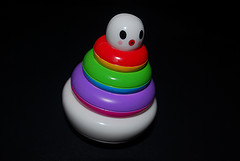an excerpt from
The Love-Powered Diet: Eating for Freedom, Health, and Joy
(c) Victoria Moran
Lantern Books, May 2009
A common complication of our fast-paced lives is that they can cause people to lose their ability, and even their desire, to play. Since many of us started regimented living in childhood—school, homework, piano lessons, ballet lessons, gymnastics class, tutoring, summer school—we never fully expressed our inherently playful propensities, even at that time in life when play comes most naturally. If we now want to play, we have to learn how to do it.
I was so committed to learning how to play and to get over my near-terminal seriousness that I actually took a course: “Play for Grown-ups.” The teacher, a professional recreator, had us hanging from monkey bars and flirting with eternity on a jungle gym from the first night. Soon we worked our way up to hide-and-seek, “Simon says,” and stacking ourselves into four-layer human pyramids at the park.
It was terrifying. And it was great.
In that class I learned that I wasn’t alone in being shy about letting loose and having a childlike good time. I was simply, like a lot of people, addicted to adulthood. With a strictly adult mindset, play is extraneous, useless, nonproductive, and a waste of time. It can even be a little scary.
As science writer K. C. Cole once stated in a New York Times article, “Play is out of control. In real play, we try things just to see what happens. In other words, we take risks.” In adult-only thinking, risk is justified in business deals, the stock market, and if someone is drowning, but to risk making a fool of oneself at roller-blade class—you must be kidding!
So don’t start with roller-blades. Start where you’re almost comfortable. My play-class teacher did warn against card games, board games, and sports in the beginning since they’re taken way too seriously. Beyond that, it’s up to you. Here are some suggestions for gently re-entering the world of play.
• Develop a better opinion of goofing off. A lot us have trouble with play because we really believe that there’s something wrong about not constantly working, worrying, exercising, answering e-mail, washing dishes, or being in some other way purposefully occupied.
• Rethink the idea of payoffs. It’s true that play does good things for the mind and body, but it interferes with genuine playfulness if you’re thinking, “This game of tag with my kid is reducing my work-related anxieties, developing a closer parent/child bond, and firming my quadriceps muscles.”
• Come at play through the back door. Befriend its cousin, laughter. Get some humor into your life every day. Read the comics. See a really funny movie. When you laugh, you’re enjoying yourself without inhibitions. The same thing happens in play.
• Observe the play experts: children and animals. After a while, you may even want to join in their games.
• Cultivate friends who are playful by nature. They’re the ones who seem to take life lightly. When you look for them, you’ll find them.
• Liberate your own playfulness. If you feel like singing when you walk, sing when you walk. They did it in Rogers and Hammerstein musicals all the time.
• Take a playful attitude into the rest of your life. This isn’t to say that there aren’t times to be serious, but a person who knows how to play realizes that most things aren’t nearly as serious as we make them. Because that person doesn’t see every incident as infinitely grave, he or she can be most effective in those situations which truly are.

